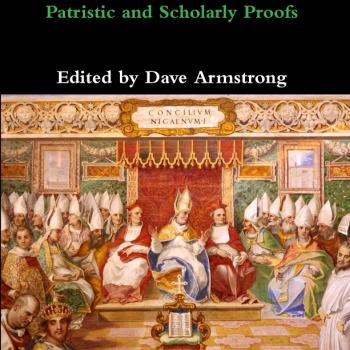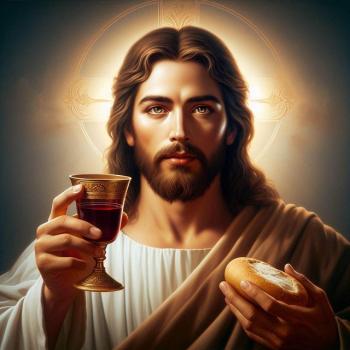Protestant apologists, in tackling the topic of sola Scriptura and whether the Church fathers believed in it or not, very often argue as follows:
Church Father X believes in sola Scriptura, because, look, see!: he praises Scripture in this place and that, and another over there, and says that Christians ought to read the Bible to learn theology! Obviously, then, he agrees with the formal Protestant principle of sola Scriptura! Who could possibly doubt it?
But this is fallacious and illogical through and through. The proper approach to this topic and what a given Church father believed is as follows:
Sola Scriptura (as classically defined by Protestants) means that Scripture is the only final infallible norm and source and standard (rule of faith) for Christian doctrine and faith. It follows from this, that neither the Church, nor ecumenical councils, nor popes, nor sacred, apostolic tradition, nor apostolic succession are infallible sources of authority. They are usually respected by the thinking Protestant, and regarded as authoritative to a degree, but not infallibly so.
We must, therefore, look to see if Church father X thinks Scripture is formally sufficient for authority (not just materially sufficient, which we agree with) without the necessary aid of tradition and the Church, or if he does not, as indicated in other statements. A thinker’s statements regarding Christian authority must be evaluated in context of all of his thought in this area, rather than having pieces taken out and then claiming that they “prove” something that they do not, in fact, prove at all.
In other words, even if we find a quote where a father seems (at first glance) to be stating something akin to sola Scriptura (since he is writing about the Bible without immediate reference to Church or tradition), we must examine what he believes about the (binding?, infallible?) authority of tradition, Church (including ecumenical councils), and apostolic succession, because the very question at hand (what is the rule of faith?) has to do with the relation of all those things (all but Scripture being non-infallible, according to sola Scriptura).
For that reason, their beliefs concerning all these other elements have to be examined, in order to understand properly how they views their relationship vis-a-vis each other, and whether or not they adhere to sola Scriptura. as the rule of faith. If they hold to the infallible authority of anything besides Scripture, they do not believe in sola Scriptura.
The Protestant always puts the Bible above Church and tradition, and denies that the latter two can be infallible. Catholics and Orthodox believe in a three-legged stool, where, practically-speaking, Church and tradition have equal authority with Scripture, because they are the necessary framework and interpretive grid through which Scripture can be properly interpreted in an orthodox sense.
With this in mind, we proceed to determine whether St. Ignatius of Antioch believed in sola Scriptura, or the Catholic rule of faith. The material below is from Philip Schaff’s 38-volume collection of the Church fathers).
***
The Church / Bishops
. . . being subject to the bishop and the presbytery, you may in all respects be sanctified. (Epistle to the Ephesians, ch. 2)
[I]f the prayer of one or two possesses Matthew 18:19 such power, how much more that of the bishop and the whole Church! He, therefore, that does not assemble with the Church, has even by this manifested his pride, and condemned himself. For it is written,
God resists the proud.Let us be careful, then, not to set ourselves in opposition to the bishop, in order that we may be subject to God. (Epistle to the Ephesians, ch. 5)[W]e should look upon the bishop even as we would upon the Lord Himself. (Epistle to the Ephesians, ch. 6)
[O]bey the bishop and the presbytery with an undivided mind . . . (Epistle to the Ephesians, ch. 20)
It is fitting, then, not only to be called Christians, but to be so in reality: as some indeed give one the title of bishop, but do all things without him. Now such persons seem to me to be not possessed of a good conscience, seeing they are not stedfastly gathered together according to the commandment. (Epistle to the Magnesians, ch. 4)
I exhort you to study to do all things with a divine harmony, while your bishop presides in the place of God, . . . be united with your bishop, and those that preside over you, . . . (Epistle to the Magnesians, ch. 6)
. . . neither do anything without the bishop and presbyters. (Epistle to the Magnesians, ch. 7)
Be subject to the bishop, and to one another, as Jesus Christ to the Father, . . . (Epistle to the Magnesians, ch. 13)
For, since you are subject to the bishop as to Jesus Christ, you appear to me to live not after the manner of men, but according to Jesus Christ, . . . without the bishop you should do nothing, . . . (Epistle to the Trallians, ch. 2)
[L]et all reverence the deacons as an appointment of Jesus Christ, and the bishop as Jesus Christ, who is the Son of the Father, and the presbyters as the sanhedrim of God, and assembly of the apostles. Apart from these, there is no Church. (Epistle to the Trallians, ch. 3)
[T]his will be the case with you if you are not puffed up, and continue in intimate union with Jesus Christ our God, and the bishop, . . . he who does anything apart from the bishop, and presbytery, and deacons, such a man is not pure in his conscience. (Epistle to the Trallians, ch. 7)
Fare well in Jesus Christ, while you continue subject to the bishop, as to the command [of God], and in like manner to the presbytery. (Epistle to the Trallians, ch. 13)
Wherefore, as children of light and truth, flee from division and wicked doctrines; but where the shepherd is, there follow as sheep. (Epistle to the Philadelphians, ch. 2)
For as many as are of God and of Jesus Christ are also with the bishop. . . . If any man follows him that makes a schism in the Church, he shall not inherit the kingdom of God. (Epistle to the Philadelphians, ch. 3)
Give heed to the bishop, and to the presbytery . . . But the Spirit proclaimed these words: Do nothing without the bishop; . . . (Epistle to the Philadelphians, ch. 7)
See that you all follow the bishop, even as Jesus Christ does the Father, and . . . reverence the deacons, as being the institution of God. Let no man do anything connected with the Church without the bishop. . . . Wherever the bishop shall appear, there let the multitude [of the people] also be; even as, wherever Jesus Christ is, there is the Catholic Church. (Epistle to the Smyrnaeans, ch. 8)
It is well to reverence both God and the bishop. He who honours the bishop has been honoured by God; he who does anything without the knowledge of the bishop, does [in reality] serve the devil. (Epistle to the Smyrnaeans, ch. 9)
Give heed to the bishop, that God also may give heed to you. (Epistle to Polycarp, ch. 6)
Sacred Tradition
Onesimus himself greatly commends your good order in God, that you all live according to the truth, and that no sect has any dwelling-place among you. (Epistle to the Ephesians, ch. 6)
Apostolic Succession
. . . that I may be found in the lot of the Christians of Ephesus, who have always been of the same mind with the apostles through the power of Jesus Christ. (Epistle to the Ephesians, ch. 11)
[Y]our presbyters [preside] in the place of the assembly of the apostles . . . (Epistle to the Magnesians, ch. 6)
Study, therefore, to be established in the doctrines of the Lord and the apostles, . . . (Epistle to the Magnesians, ch. 13)
[Y]ou . . . should also be subject to the presbytery, as to the apostle of Jesus Christ, . . . (Epistle to the Trallians, ch. 2)
[L]et all reverence . . . the presbyters as the . . . assembly of the apostles. (Epistle to the Trallians, ch. 3)
[T]his will be the case with you if you are not puffed up, and continue in intimate union with . . . the enactments of the apostles. (Epistle to the Trallians, ch. 7)
See that you all follow . . . the presbytery as you would the apostles; . . . (Epistle to the Smyrnaeans, ch. 8)
Councils
It is fitting, O Polycarp, most blessed in God, to assemble a very solemn council, and to elect one whom you greatly love, and know to be a man of activity, who may be designated the messenger of God; and to bestow on him this honour that he may go into Syria, and glorify your ever active love to the praise of Christ. (Epistle to Polycarp, ch. 7)
***
Related Reading
For much more on sola Scriptura: see my Bible, Tradition, Canon, & “Sola Scriptura” web page.
For documentation of many more Church fathers who rejected sola Scriptura, see the “Bible” section of my Fathers of the Church web page.
***
Practical Matters: Perhaps some of my 3,900+ free online articles (the most comprehensive “one-stop” Catholic apologetics site) or fifty books have helped you (by God’s grace) to decide to become Catholic or to return to the Church, or better understand some doctrines and why we believe them.
Or you may believe my work is worthy to support for the purpose of apologetics and evangelism in general. If so, please seriously consider a much-needed financial contribution. I’m always in need of more funds: especially monthly support. “The laborer is worthy of his wages” (1 Tim 5:18, NKJV). 1 December 2021 was my 20th anniversary as a full-time Catholic apologist, and February 2022 marked the 25th anniversary of my blog.
PayPal donations are the easiest: just send to my email address: [email protected]. You’ll see the term “Catholic Used Book Service”, which is my old side-business. To learn about the different methods of contributing, including 100% tax deduction, etc., see my page: About Catholic Apologist Dave Armstrong / Donation Information. Thanks a million from the bottom of my heart!
***
Photo credit: Dosseman (5-19-18). The Decumanus Maximus (the main east–west-oriented street), in Antioch (in present-day Turkey). [Wikimedia Commons / Creative Commons Attribution-Share Alike 4.0 International license]
***
Summary: St. Ignatius of Antioch (d. c. 117) didn’t believe in sola Scriptura as the rule of faith, and held to the sublime authority of the Church, bishops, and apostolic succession.














